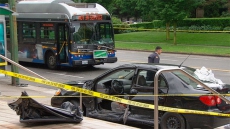Students will need deeper pockets to study at Canadian universities over the next four years with annual fees projected to rise 13 per cent on average to $7,755, having almost tripled over the past 20 years, according to a new report.
Students in Ontario can expect to shell out $9,483 on average in tuition and other compulsory fees in 2017-18. Fees in the province have nearly quadrupled over the last two decades, said the Canadian Centre for Policy Alternatives.
The high cost of getting a degree is an "enormous financial stress" for students and their families, said Erika Shaker, director of the left-leaning think-tank's education project.
"All the evidence both in Canada and the U.S. does indicate that financial stressors on students are even more pronounced than stressing about academic performance," she said.
But if high-school graduates don't like the idea of subsisting on a diet of Kraft Dinner and ramen noodles, they may want to head to Newfoundland and Labrador, which is getting top marks for its low fees that are projected to reach $2,888 in 2017-18. They've increased by 35 per cent over two decades.
Provincial funding for universities is inadequate, the report said. Universities are seeing it decline as a share of their operating revenue, while tuition fees are going up.
Several provinces are trying to "mitigate the optics" of ever-higher tuition fees with such policies as capping increases to the cost of living, it said.
Ontario offers to refund up to $1,780 in tuition fees to students. But it doesn't directly reduce tuition and doesn't apply to all undergrads, such as part-time students, the report noted.
The funding gap is driving universities to download more costs on students by charging additional compulsory fees on top of tuition that are subject to few, if any, restrictions, the report said. Those fees — such as athletic fees and student association fees — amounted to $817 on average last year, with Alberta having the highest and Newfoundland the lowest.
"Universities are having to get a little bit more creative about how they're increasing their revenues and taking them out of students," said Shaker.
"What we are seeing are some institutions actually implement new fees entirely: fees to graduate, for example, or facilities fees."
It makes it very difficult for students to predict how much they'll have to pay in the coming year, said Jessica McCormick, national chairwoman of the Canadian Federation of Students.
"It also means that it's difficult for students to save up to cover the cost of tuition fees," she said.
"Students are working throughout the summer and during the year, in either part-time or sometimes full-time jobs, and they are still required to take out loans to be able to cover all of those costs."
Shaker said government efforts to clamp down on tuition hikes don't seem to be working.
The average fee is blowing through the caps because there are a number of programs that don't have to observe them.
Students are also expected to pay "vastly different" tuition based on where they live and where they want to study, which undermines the universality of post-secondary education, she said.
Some provinces — such as Nova Scotia, Prince Edward Island Saskatchewan and Ontario — have two-tier fee structure, providing more financial breaks to in-province students than those from outside the province, she said.
However, Newfoundland's approach to making university education affordable seems to be working, said Shaker. It has one of the lowest tuition fees in the country, having rolled it back by 25 per cent a decade ago and capped them. The province is even slated to eliminate the provincial portion of student loans and replace them with needs-based grants by 2015.
It realized long ago that investing in post-secondary education would help combat poverty, which benefits the province, she said. Others need to realize that there are "enormous returns" to having affordable post-secondary education.
"The public investment in post-secondary education is sadly declining ... the individual contribution is increasing," Shaker said.
"That's a significant concern for families who are already dealing with stagnant incomes, who are already dealing with high levels of household debt."





